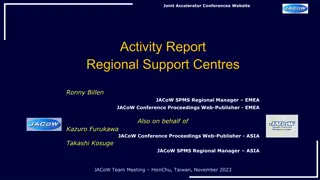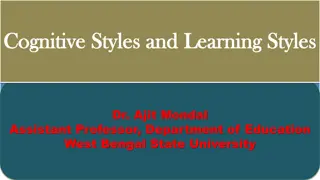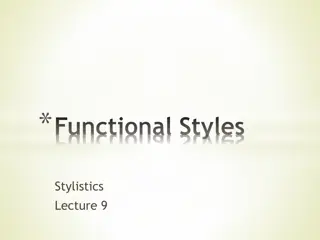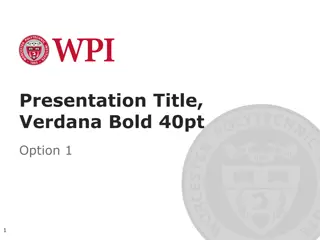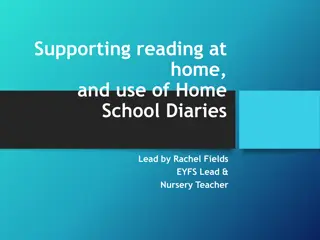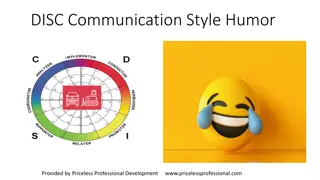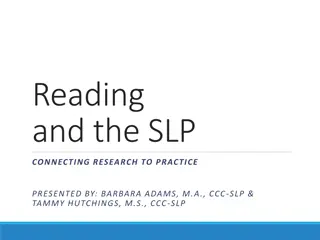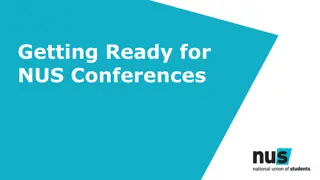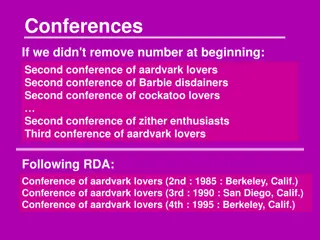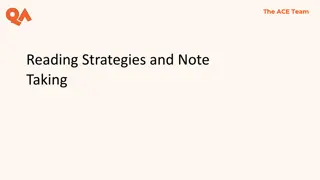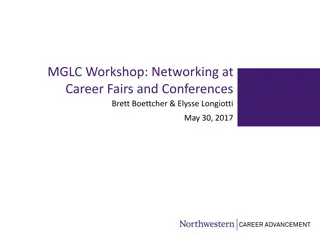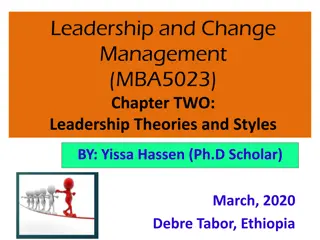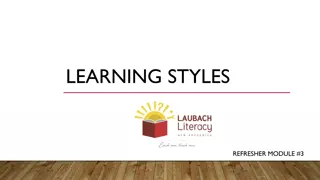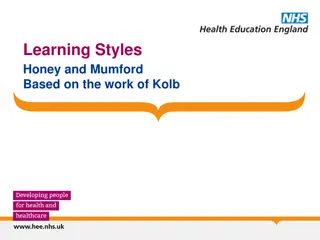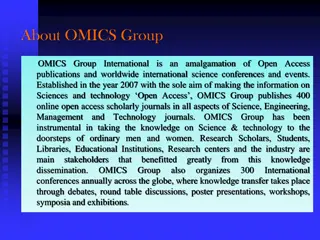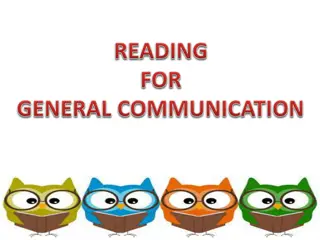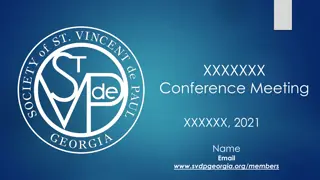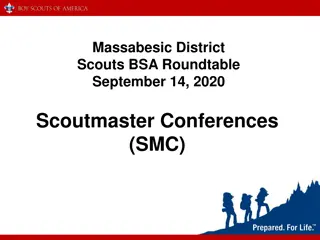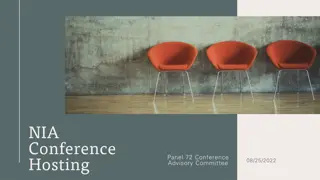Importance of Reading Conferences and Different Conference Styles
Reading conferring is a crucial aspect within the ELA or literacy block that allows teachers to connect with students individually, understand their reading abilities, and provide tailored support. Different conference styles such as Research and Teach, Compliment, and Coaching and Goal Setting offer various approaches to helping students improve their reading skills and meet their goals. Understanding the purpose and types of conferences can enhance teachers' ability to support student growth effectively.
Download Presentation

Please find below an Image/Link to download the presentation.
The content on the website is provided AS IS for your information and personal use only. It may not be sold, licensed, or shared on other websites without obtaining consent from the author. Download presentation by click this link. If you encounter any issues during the download, it is possible that the publisher has removed the file from their server.
E N D
Presentation Transcript
WHY CONFERRING? FORMING READING CONNECTIONS WITH STUDENTS K. SLATTERY- READING CONFERRING IN THE K-5 CLASSROOM [LESSON 1]
WHAT IS CONFERRING? Reading conferring is a special time that takes place within your ELA or literacy block. One-on-one conferring can be carefully scheduled into your block and provide you with the chance to meet with students individually and get to know them as readers. According to conferring specialist Jennifer Serravallo, reading conferences are where you become a researcher as you learn about your students and they learn from you (Serravallo, 2019, p.1) In conferences, students reflect, show what they ve learned, ask for support, and practice strategies (Serravallo, 2019, p.2). On the other hand, teachers can assess, support new or older strategies, and give feedback. Let s look ahead at some essential components of a reading conference, as well as different types of conferences!
TYPES OF CONFERENCES Before conferring, teachers must look at what type of data they are wishing to collect or what type of skill they are trying to teach. While there are some basic components in all reading conferences, conferencing can differ based on what YOU, as the teacher, are looking to do. The most commonly used types of conferences are listed below: Seravallo, 2019, p. 9
A deeper look into each conference style As you continue reading about each style, think about which purpose best fits your classroom needs! Research and Teach Compliment Coaching and Goal Setting A research and teach conference runs more along the lines of an assessment conference. First, a teacher would inquire about the child s book to get a feel for where the child is at. Then, the child would read aloud to the teacher, as he/she listens for possible teaching points. To finish off the conference, the teacher would give a compliment and then suggest a teaching point (skill) for the child to work on. Check out STICKY TEACHING in lesson 3 for advice on leaving teaching points with students. In a coaching and goal setting conference, a teacher might look back at a student s self-created reading goals. Then, the teacher would pick a goal and suggest tips for how students can accomplish that goal. A new teaching point or teaching of a strategy might be found in this type of conference as it would be appropriate to give a child specific guidelines on how to meet their goals. In a compliment conference, teachers look to offer more positive feedback on a specific skill that students are doing well with. Within a compliment conference, teachers may not create another teaching point, as they are really just looking to encourage and check in with a child on their goals. Serravallo, 2019, p. 9
Whats YOUR Purpose? As you continue reading about each style, think about how each conference style presents different data. What can you use conferring data for in your classroom? Compliment Coaching and Goal Setting Research and Teach Teachers can use this data to: Teachers can use this data to: Teachers can use this data to: See student strengths See student strengths See student strengths Celebrate a student s work on a specific skill Support a child working on a specific skill and guide them Progress Monitor work on a specific skill Progress Monitor work on a specific skill Determine where to go with future lessons (Is re-teaching needed?) Determine where to go with future lessons (Is re-teaching needed?) Determine grouping for future strategy group lessons. Assess progress for report cards. More information on data recording can be seen in Lesson 3.
CONFERRING ESSENTIALS While not all conferences will lend themselves to each component, the conferring essentials listed below will help you start to think about shaping your own reading conferences. Conversation
At this point in the lesson, you will pause to watch 3 different examples of reading conferences from reading specialist Jennifer Serravallo and her company Heinemann. WATCH AND THINK: While watching the sample conferring videos, be on the look out for essential components of a reading conference. You may wish to take notes. Soon, you will discuss the essential components of reading conferences, as well as address how and why type of conferring could be used in your own classroom! Video 1: Compliment Conference Video 2: Coaching Conference Video 3: Research and Teach Conference
LETS REFLECT! Your final task for this lesson is to compose a reflective discussion post that discusses the following questions. Please refer to the PowerPoint Presentation, videos, and article provided (link on the references page) for evidence to support your ideas. Discussion Questions: What are the essential components of a reading conference and why are they important? How can conferring within your daily reading or literacy block help you? What kind of data collection are you looking for? What type(s) of reading conferences do you plan to look into using in your classroom? Why? Please return to the Lesson 1 Page (within the mini course) to collaborate in the Lesson 1 discussion forum.
REFERENCES Images: MyCuteGraphics.com. (2019). Girl watching movie with popcorn. Retrieved from https://content.mycutegraphics.com/graphics/movie/kid- with-movie-popcorn-drink.png MyCuteGraphics.com. (2019). Kids sitting on books. Retrieved from https://www.mycutegraphics.com/graphics/book-images.html MyCuteGraphics.com. (2019). Reading center on rug . Retrieved from https://www.mycutegraphics.com/graphics/reading-center-clip-art.html Text: Serravallo, J. (2019). A teacher s guide to reading conferences grades K-8. Portsmouth, NH: Heinemann Videos: Serravallo, J. [Jennifer Serravallo]. (2014, October 30). Coaching conferences [Video File]. Retrieved from https://www.youtube.com/watch?v=o6M4pR7iZdE&t=109s Serravallo, J. [Jennifer Serravallo]. (2014, October 30). Compliment conferences [Video File]. Retrieved from https://www.youtube.com/watch?v=7GKTU2PsKEc Serravallo, J. [Jennifer Serravallo]. (2014, October 30). Read-decide-teach conference [Video File]. Retrieved from https://www.youtube.com/watch?v=3g9vk07JkFs


